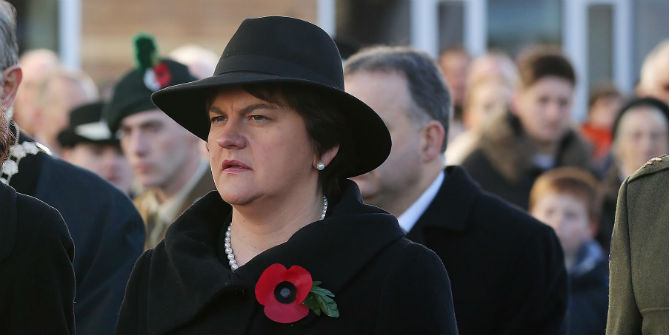 Why did the DUP veto the proposed border arrangements for Northern Ireland? It was not because of pragmatic considerations, writes Anthony Costello (University College Cork), but through the simple desire to reassert unionism – even at the cost of a hard and damaging Brexit. Only if Northern Ireland can negotiate a new power-sharing deal will it be possible to force the party to properly represent the peoples of Northern Ireland.
Why did the DUP veto the proposed border arrangements for Northern Ireland? It was not because of pragmatic considerations, writes Anthony Costello (University College Cork), but through the simple desire to reassert unionism – even at the cost of a hard and damaging Brexit. Only if Northern Ireland can negotiate a new power-sharing deal will it be possible to force the party to properly represent the peoples of Northern Ireland.
The signing of the DUP-Conservative deal in June 2017 sent shockwaves throughout the UK and Ireland. For many observers, the deal cemented the foundations of a hard Brexit. But for those thinking outside the box – such as members of the Southern Irish government – it symbolised the opportunity to soften the UK’s obscure Brexit preferences.
According to this logic, the Democratic Unionists – in their new-found proximity to the British government – would use their political influence to make Westminster aware of the grave consequences that would ensue from a hard Brexit. Many observers questioned this notion, arguing that it naïvely overlooked the historical and contemporary politics and culture of the DUP. Still, some maintained that a combination of the economic and political constraints facing Northern Ireland, executive technicalities and party political ambition would surely influence the DUP to think pragmatically.

Now that the DUP enjoys considerable sway over the fate of Theresa May’s government, this small regional party has plenty of influence in the Brexit negotiations. It has used it to bring the Brexit negotiations and any opportunity for compromise to a standstill.
Since the deal was signed five months ago, the DUP has been relatively silent about Northern Ireland’s preferences. Instead, the party has repeatedly advocated a stance that would give the region equivalent status to the rest of the UK post-Brexit. Evidently, for the DUP the consequences of a hard Brexit are of little consideration as long as unionist objectives are met.
In the meantime, the Conservative Party is gradually learning that their initial ambitions for Brexit are unrealistic. Their proposals have shifted from a ‘frictionless border’ using technology to monitor trade and customs, to an offer of continued regulatory alignment. The latter would shift the external border of the UK to the Irish Sea, affectively creating separate rules for Northern Ireland that would bring the region’s trade rules and procedures into line with those of the Republic
Creative thinking in the face of such complexity must be admired. But the fact remains that the UK’s preferences to date have been fundamentally unrealistic and obscure. A hard Brexit – one which sees the UK leave the Single Market and the customs union – necessarily means a hard border between Northern Ireland and the Republic. It is difficult to see how special status for Northern Ireland would be politically feasible. Continued regulatory alignment for Northern Ireland alone would place Northern Ireland in a politically and economically vulnerable position – not least because it would be a devolved UK region influenced by EU trade legislation and regulations, but with no representation at the EU level because it would be a mere autonomous region of a sovereign non-member of the EU.
The uncertain logistics of trade and customs rules for Northern Ireland separated by a sea border would cause considerable problems for both the region itself and its southern neighbour. From a political perspective, this is not in the DUP’s interests. They perceive it as pushing Northern Ireland closer to the Republic and weakening its ties with the rest of the UK. DUP leader Arlene Foster has made it very clear that any deal agreed between the UK and EU should not create special arrangements for Northern Ireland that could weaken its position in the UK. The fate of the UK is the fate of Northern Ireland, she argues, and this must not be compromised.
The DUP’s objections to regulatory alignment for Northern Ireland alone are sensible and pragmatic. Although David Davis has indicated that the policy would apply to the whole of the UK, this has not been confirmed by the Conservatives. The option has uncertain political and economic consequences for both Ireland and the UK. However, while the DUP’s rejection is commendable in one sense, the reasoning behind it is very concerning.
In recent days, it has become clear that the DUP’s reasoning comes not from a place of economic, legal or constitutional logic, or even concern for the economic prospects of Northern Ireland and North-South relations. It is firmly rooted in nothing more than staunch unionism and romantic notions of British nationalism. From statements made by Arlene Foster and her party peers, Northern Ireland’s unique conditions are of little importance to the party in terms of the Brexit negotiations and outcomes. The DUP’s aim is nothing more than the reassertion of the British identity of Northern Ireland, guaranteed by distancing the UK from the EU. Regardless of the consequences of Brexit for Northern Ireland, and the potential consequences of a hard Brexit for the stability of the DUP party, Foster and her peers are willing to sacrifice the preferences and interests of a majority of the Northern Irish peoples for the sake of a party-centric goal. Even more concerning is the free rein that Foster has in the absence of Executive constraint in Northern Ireland.
The DUP can no longer be considered a potentially positive constraint on British preferences in the sense of influencing a soft Brexit for the whole of the UK. Holding the balance of power in Westminster, they risk derailing the whole Brexit process. To reiterate, the rejection of continued regulatory alignment is not the key problem. It is the party’s reasoning behind the rejection that is of concern – their willingness to jeopardise everything for a hard Brexit that secures their unionist identity. The DUP argues that it does not wish to see a hard border between North and South, yet their actions in recent days clearly indicate a desire for a hard Brexit, which must mean installing a hard border. This may be only the first of a series of DUP refusals to compromise.
More than ever, Northern Ireland needs a power-sharing arrangement and the return of legitimate representation. Only through this can executive constraints be put in place in Northern Ireland that might encourage the DUP to rethink their position.
This post represents the views of the author and not those of the Brexit blog, nor the LSE.
Dr Anthony Costello is a Lecturer in the Department of Government and Politics, University College Cork.







“The DUP’s objections to regulatory alignment for Northern Ireland alone are sensible and pragmatic.”
And yet
“In recent days, it has become clear that the DUP’s reasoning comes not from a place of economic, legal or constitutional logic, or even concern for the economic prospects of Northern Ireland and North-South relations. It is firmly rooted in nothing more than staunch unionism and romantic notions of British nationalism.”
There’s an element of inconsistency here.
The point I tried to make was that rejection could be considered sensible under other circumstances due to logistical/technical concerns, but the DUPs intent/reasoning for rejection was not necessarily sensible.
Thank you for highlighting this. You are correct in observing that it is inconsistent on paper. I do hope that response makes more sense.
Wow, what a charming man. All credit to you for replying at all but to do so with such grace is a pleasure to behold. If only all debate were conducted with such courtesy.
There is nothing inconsistent in this post. If very sentence is read in it’s context, it all makes perfect sense.
It emphasises that the DUP’s position is not economically, legally or constitutionally logical. It is simply based on an emotional connection to a form of British imperialism that became obsolete 50 years ago.
It could be argued that the “Troubles” were not primarily caused by the IRA, but the refusal of Ian Paisley senior and the DUP to acknowledge the constitutional realities of the modern world. In this context it is very sad, if not tragic, to see a DUP not controlled by Ian Paisley senior now retreat to the very position which helped create the “Troubles” in the first place.
It should be remembered that 55% of the population of Northern Ireland voted Remain in the referendum. This means that, as well as most nationalists, a substantial minority of unionists do not wish to see a return to the “hard Border” of the past.
What would happen if the UK decided that a soft border was acceptable without regulatory alignment as they were willing to accept an e-border but the Irish (/EU) rejected this. Could we end up with no UK border controls but Irish boarder posts being set up?
Hi Michael,
I suppose so :). On the Norwegian / Swedish border there are ten customs posts for trucks that have failed to pre-declare. Some are staffed by one country and some by the other and each does the checks for both.
The remaining 30 crossings have no infrastructure but trucks must pre-declare to use them.
But of course in the end the UK and Ireland will have to cooperate on the border and that means that agreement – and compromise – is inevitable, despite the sound and fury of the past days.